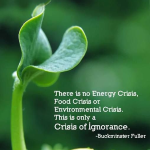
Harnessing Gas Revenues to Build a Sustainable City in Bagamoyo by The Three Leg Stool
 Jan Moritz Onken Oct 31, 2015 06:42 |
Good luck !!! |
 Claudia Singer Oct 31, 2015 10:53 | Great proposal, I hope it will succeed to be heard and implemented. My best wishes Claudia
|
 Michael Hayes Nov 14, 2015 05:59 | Dear Dr. Léautier, Your proposal offers the reader an interesting vision of how a relatively small community/nation can be transformed through collaborative efforts working on many fronts at one time. Just out of curiosity, why would the effort be limited to achieving carbon neutral as opposed to carbon negative status? Working with the local marine resources (energy/biomass) would allow for a C- status to be established early on. However, will those making money off of the gas be willing to invest in an advanced C- infrastructure which would make gas (or the use of FFs in general) obsolete? Best regards, Michael
|
 Frannie Léautier Nov 15, 2015 03:21 | Proposal contributor Dear Michael, Thank you for the comment which I find very interesting. Indeed there is a possibility to work towards a carbon negative status in the medium to long term. In the short term, due to existing technologies in transport and manufacturing, and the competing interests in the gas economy, those opportunities are constrained. One could plan on using the momentum given by the greenfield opportunity in the development of the port that this case presents, to work towards a carbon negative status--replacing existing technology over time, using the local marine resources as you suggest, while planning for the depletion points in the gas reserves. So far, there have been no interests expressed to exploit the local marine resources and we would welcome any stakeholders that would materialize to collaborate on such an opportunity. Best regards, Frannie |
 Quinton Zondervan Nov 20, 2015 11:50 | You do realize that natural gas is a fossil fuel? |
 Frannie Léautier Nov 21, 2015 10:44 | Proposal contributor Indeed natural gas is a fossil fuel. However it is less polluting than diesel generation which it would be replacing at the country level. Furthermore, sales from natural gas extraction could be used to invest in building a sustainable city in Bagamoyo--green design, clean transport etc. Hence one could aim for carbon neutrality in Tanzania and carbon negative development in Bagamoyo. |
 Michael Hayes Dec 1, 2015 05:51 | Hello Frannie, Thank you for the answer. I believe that China's Marine Silk Road Initiative may be a great opportunity to begin building the foundation for a large scale marine biomass production effort. If you would like information on the marine tech. or know of someone at the local level which would welcome such, please let me know. I'm in contact with a number of the primary researchers in a number of related fields. They and I would greatly appreciate any opportunity to get this type of work started. Michael |
 Michael Hayes Dec 2, 2015 02:56 | Further, When I read Quinton's remark I first thought it simply smacked of rudeness yet I also realize that few people have actually studied 1) the macroeconomics of transitioning from a FF dominated energy matrix to non-FFs or 2) the science of how our atmosphere has become actually addicted to the carbon/sulfur emitted by FFs. On issue #1: Income from FFs can be transformative to a small nation and a wise government would use that income for diversifying it's economy into areas which reflect state-of-art sustainable technology. Also, the advent of fracking has opened up gas production in almost every region of the planet and thus we are in a perpetual state of over production/low prices. In short, a developing nation such as Tanzania, which has just recently entered into the global FF market, should use it's natural resources to it's citizens' best advantage while investing in a future carbon neutral/negative infrastructure which will be a benefit to it's future generations (after the FF era) and the world as a whole. A brief study of the resent history of Tanzania's management of this sector shows that it is well aware of the multiplexed dynamics of the complexities surrounding that sector. A well done assessment of the nation's gas production management efforts can be found in the following dissertation: The Natural gas sector in Tanzania. Suggestions for a better framework to benefit the Country. On point #2: We actually can not simply stop all FF usage due to the fact that the black carbon and sulfur combination (sulfur opens up black carbons surface to H2O), emitted through burning FFs, is keeping our stratospheric moisture levels down by around 10%. This artificial reduction in moisture is largely believed to be responsible for a temperature 'plateau' beginning at the turn of this century. Please see: Stratospheric water vapor decline credited with slowing global warming In brief, the use of FFs needs to be ramped down not simply shut off as a dramatic reduction of use could spike our global temperature beyond a point which would most likely trigger multiple tipping points and our collective ability to mitigate/adapt to them. Obviously, during the ramp down the profits should be used to build a future global carbon negative infrastructure (IMMHO). Michael |
 Frannie Léautier Dec 17, 2015 07:58 | Proposal contributor Michael, thank you for the detailed response to the questions from Quinton. Indeed after the COP21 agreement in Paris, countries are to develop their plans and implementation strategies and arrangements to reduce carbon emissions. I would like to put you in touch with Uongozi Institute in Dar es Salaam, an organization that would be playing a leading role in helping countries define and prioritize actions and report on achievements. They would also be able to support the dissemination of information and introduction of technologies such as marine large scale biomass and other choices around ramping down fossil fuel use. They also are tenants in the Bagamoyo marine ecosystem and are developing a green design for their own facilities at the site. Several of their members are supporting this initiative and can update the proposal accordingly. Frannie |
 Mark Roberts Jan 18, 2016 12:58 | This is an excellent and very timely proposal, and one that I think we at the African Institute for Mathematical Sciences in Tanzania would be keen to contribute to. We have very recently moved to Bagamoyo where we run a Masters program which currently has 49 very bright students from 13 African countries enrolled on it. Statistics and modeling are major themes and we are looking for interesting and relevant projects to which they can be applied. We would be delighted if, in the framework of this proposal, MIT alumni and/or other researchers could suggest and help supervise student projects that would contribute to developing Bagamoyo as an exemplar of sustainability. Subject to availability we may also be able to provide a physical base in Bagamoyo to visiting researchers working on this project. And, of course, we will be aiming to make our campus carbon neutral and would be delighted to receive suggestions on what strategies we could employ to achieve that! Mark
|
 Michael Hayes Jan 19, 2016 04:31 | Dear Frannie et al., As you may know, there is now a group of high end investors willing to look at the important need for carbon neutral/negative projects which are specifically designed for use in developing nations. Your proposal does seem to be the type of concept which meets many of the stated objectives of that coalition. The BREAKTHROUGH ENERGY COALITION (BEC) is new and getting any type of feedback before the CoLab contest ends may not be possible. Yet, the one thing that will attract MIT alumni participation (to any project) will be an ability for the alumni to work on projects which are being directly observed by this specific investment coalition. As such, simply gaining recognition by the BEC management is of value. Also, the BEC managers may be interested not only in the ability to work at a national level within a developing nation but also find the potential of leveraging their investment through the close cooperation with the development of the Marine Silk Road project. I encourage your team to make contact with the BEC managers, at this time, and let them know your intentions are well within the coalition's overall goals and that your project may offer unique Research, Development, Demonstration and Deployment investment leverages. In simple words, they may find that your plan represents an important and unique living lab for carbon neutral/negative systems RDD&D (as I do) as well as a way to reduce their initial RDD&D investment risks. Michael |
 Frannie Léautier Jan 25, 2016 04:04 | Proposal contributor Dear Michael, Thank you for your comments and suggestion. I have sent a message to the BEC and I am waiting for a response. I do believe (as you do) that we have a chance for unique impact in a "living lab" setting where we can learn from alternatives what is critical for scaling up. I will update the proposal accordingly. Dear Mark, Thank you for the interest in joining the proposal and for your concrete suggestion on how we can work together. I will update the proposal to include the partnership approach you propose. Best, Frannie |
 Greg Robie Jan 25, 2016 09:18 | As I understand the current climate modeling science relative to avoiding abrupt climate change, even the concept that this is possible (avoiding abrupt climate change) is, at best, contentious, at worst, abrupt climate change is tipped into. Since the macro forces driving CapitalismFail have increased CO2 emissions about 60% in the quarter of a century that reducing these emissions has been focused on, I am less sanguine about the substance of the Paris Agreement. I am challenged to see it as anything other than a game theory 'success' story for effecting a functional greenwash for business-as-usual. Urbanization is a social choice that was necessitated by the economic dynamics of the industrial revolution. Another way to understand the trend framing the need for this proposal, is that ,developing' countries are repeating the choices made by the 'developed' ones who created the Anthropocene. To the best of my knowledge, the climate system will only respond to the humanity that practice's CapitalismFail, keeping the fossil carbon in the ground with, I believe, at least an immediate 10%/yr. reduction in carbon emissions. The point made about sulfates is HUGE. We are in a Laws-of-physics induced, Catch 22. This needed reduction in emissions on the one hand will, on the other hand, generate an unmaking of the heating that is already in the system. In addition, the modeling that suggests the 2°C track can be effected incorporates scaled technology for carbon capture and storage (e.g. BECCS). Such technology has not been 'economical' for the 'Developed' World to choose and implement. I believe there are two power plants on the planet that are constructed and incorporate the technology. The most recent one (which took six years to build), and to be profitable, is pumping the captured CO2 80 miles to be injected into oil fields. There it is used the oil fields' post-peak production extraction of oil. The Paris Agreement with its yet-to-be-negotiated cap & trade with offsets approach to "mitigating" carbon emissions is disingenuous. Systemically, it precludes the economics that are necessary to build a carbon-negative power plant. By extrapolation, a carbon-negative city, while technically possibly, is an laboratory pipe dream. And, to the degree Cuba's "Special Period” was a laboratory, those leaving subsistence lifestyles for jobs in urbanizing areas, are repeating choices that were made in Britain at the outset of our climate disrupting paradigm of CapitalismFail. Luddites did not change the course of history. But, as triggered abrupt climate change and the rationalizing behind MIT's Plan for Climate Change demonstrate, humanity would be better of today had the wisdom of Luddites been grasped, trusted, matured and 'religiously' sustained. Isn't stemming the tide of debt slaves that CapitalismFail drives to the cities a matter of honor? Isn't making it possible for modern indigenous 'Luddites' to live sustainable/subsistence-like lifestyles, the needed–if ignored–agriculture-base demonstration plots for imagining something other than greenwashed BAU? The current credit-expanding efforts of the IMF are a response to the threats of peak credit. CapitalismFail's dependence on credit, based on energy slaves in this time of peak conventional oil, requires this. Creating a rationale for credit-expansion, by nurturing and then exploiting urbanizing centers in the 'Developing' World is systemic. Participating in this dynamic is a following in the footsteps of the non-Luddite Brits and the nations spun out of its empire. It is a further abandoning of whatever sovereignty may yet remain for countries like Tanzania. In the 'Developed' World, ours is long gone; given to the global economies financial institutions (& in the US, unconstitutionally so). As the 2018 report required by the Paris Agreement will report, a consideration of 1.5°C will be like the 2°C goal, a choice that is thermodynamically in the rearview view mirror of the bullet train of CapitalismFail? Africa will be, ecologically, and but for motivated reasoning, premeditatively, toast. |
 Greg Robie Jan 25, 2016 09:23 | Whoops! Missed auto-correct: that's "generating an unmasking of the heating that is already in the system." |
 Michael Hayes Jan 26, 2016 05:56 | Hello Frannie and team, I want to thank you for mentioning marine biomass in your proposal. It is a subject that is not well known at the general public level yet the marine space holds truly vast stores of sustainable resources which can potentially provide us all with adequate essential commodities such as bio-fuel, food, feed, organic fertilizer as well as water itself. Also, I wanted to bring to your attention 2 items which may be relevant to your proposal. The first item is the CoLab 2015 U.S. National challenge winner: Plan to build low-carbon cities from the ground up in the United States. This proposal reads right upon your efforts and the proposal received a high level of acceptance from the judges. Bagamoyo offers a relatively clean canvas upon which to create the equivalent of a living prototype capable of inspiring a global trend in new neutral/negative carbon city design and construction around the globe. The second item is the concept of urbane metabolism. This is a subject which you and your team are well informed on as it is the underlying technical, socioeconomic, and policy challenge set which you and your team are up against. The general reader of your proposal, however, may be interested in learning more about the concept as it showcases the high level of complexities and synergies which underpin your efforts. As you know, one of the global leaders in the field of urban metabolism concepts is an advisor within this CoLab challenge. The work of Prof. John E. Fernández should be mentioned in the proposal not as a form of 'smoozing' up to a 'judge' but as a recognition of the superior nature of his and his team's work in the field. Their work simply should not be left out of any discussion concerning the design and construction of new neutral/negative carbon cities. Period. As a general reader, I would like to see the above 2 items of interest, a past related CoLab winner and the core intellectual knowledge base of urban metabolism, mentioned at the end of your presentation in the form of a 'Further Reading' section. To conclude, I've been plugging away at these CoLab challenges for so long that I rarely get excited about the outcome of them anymore. Yet, your proposal could be a breakout proposal and, as such, I am excited to see your team win. Greatest respects, Michael |
 Michael Hayes Jan 26, 2016 05:22 | Dear Greg, Concerning your comment of "The point made about sulfates is HUGE. We are in a Laws-of-physics induced, Catch 22."; James Lovelock describes the 'catch 22' as the "Fools Atmosphere". If you have not read his work, I do highly recommend immersing yourself in his writings. Michael |
 Frannie Léautier Jan 27, 2016 12:05 | Proposal contributor Dear Greg, Multi-stakeholder dialogues that involve the views of local communities, policy makers, businesses, and local researchers (such as the African Institute for Mathematical Sciences and Uongozi in this proposal) and other decision-makers coming from outside (in this case the partners from MIT, Columbia, Sciences Po), provide an opportunity for real time testing and adjustment of a wide range of solutions in an open learning and real life environment. Chances for discovery from such practice are high as are those for limiting mistakes. As you may know, sovereignty depends on capacity and knowledge in addition to power. The developers of this proposal (many of whom are from Africa and some from Tanzania) are of the view that infusing knowledge and ideas in a collaborative setting is a good way to mitigate the risks you mention. The work of Karin Bäckstrand on civic science for sustainability provides a very good explanation on how one can reframe the roles of experts, policy makers and citizens for governance and sustainability. Frannie |
 Eric Champagne Jan 28, 2016 05:42 | Very interesting initiative. Good luck! |
 Eric Champagne Jan 28, 2016 05:42 | Very interesting initiative. Good luck! |
 Hany Besada Jan 29, 2016 03:00 | Dear Frannie and Cristina I commend you for initiating this very exciting and timely initiative. I pray that it gets implemented. I am very certain that it would make a valuable contribution on the ground. Best of luck. Kindest regards. Hany |
 Frannie Léautier Jan 30, 2016 03:20 | Proposal contributor Thank you for the comments Hany and Eric. I trust we can work together on natural resource management issues. The experience you have at the University of Ottawa, Eric, and that you have garnered at the UNECA, Hany, would invaluable for the success of this initiative. Warm regards, Frannie |